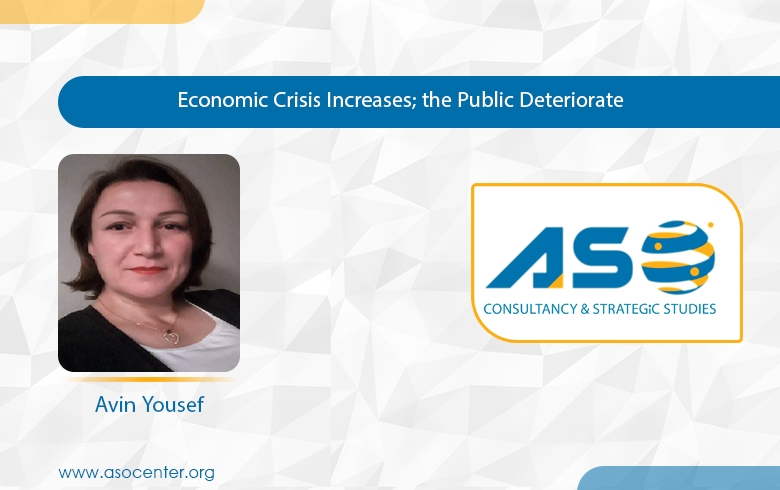

Economic Crisis Increases; the Public Deteriorate
2020-01-28
Writer: Avin Yousef
The economic crisis ravaging in Syria, which appeared recently due to the high exchange rate of the dollar against the Syrian pound, is not instant rather it was hiding and has appeared now. The Syrian government have always depended in its economy on oil, agriculture, livestock, as well as, some local industries. Oil production has highly decreased in the last few years where oil production in 2008 reached 406 thousand barrels, whereas, it decreased to 24 thousand barrels in 2018, according to the statistics of “British Petroleum” oil platform.
The oil reserves in Syria is considered negligible in comparison to reserves of other countries like Saudi Arabia of which oil reserves reach 268 billion barrels in comparison to 2.5 billion barrels of oil reserves of Syria.
The aforementioned oil rates are more less than extracted from the ground, for crude oil, natural gas and phosphate are of the most significant underground wealth on which the economy of Syria depends. However, the actual extracted quantities were not acknowledged due to the secrecy of the Syrian government regarding the reality of underground wealth, as the subject of oil was considered a “red line” and is completely prohibited to be discussed.
After the Syrian crisis in 2011 many facts were revealed, one of which was the amounts of extracted oil which are much more than the universally approved amounts. These proceeds were not included in the budget of the state rather they were being sold at prices lower than the international price; in exchange for charging its value in foreign currency in cash. Of course, the proceeds of these oil barrels were deposited into power holders bank accounts outside Syria.
After most of the oil fields came out of the control of the Syrian government, the situation was not better. As the oil fields remained for a long time under the control of armed factions and ISIS, extracting the oil in rudimentary methods, which never benefited the people. After liberating those areas; being under the control of SDF and returning oil fields, however, the fate of the oil remained unknown. This is due to the presence of powers like America and Russia and the attempt of each to control and monopolize that wealth.
As for both livestock and agricultural wealth, they were not better off than the underground wealth, since agricultural crops were sold to agricultural centers and associations at cheap prices. Consequently, farmers were helpless, therefore the options were either they destroy their crops or sell them to the government. The area of agricultural lands invested is approximately 5.7 million hectares, between irrigated and rainfed; thus, approximately one million of rural inhabitants work in agriculture.
The agricultural sector has seriously deteriorated, during the years of the Syrian crisis, due to high fuel prices, insecurity, grains and fertilizers high prices, labor migration and climatic factors. The most influential factor in the agricultural sector was war, which caused insecurity and burning of agricultural crops. Likewise, elements of armed factions uprooted olive trees, which were considered one of the most essential agricultural productions in Syria. The deterioration of agriculture has, significantly, resulted in decline in the animal production, due to the high prices of fodder, the closure of passages and the control of armed factions on the roads linking between the interior areas of Syria.
There are other factors that affected the Syrian economy, namely; the economic and commercial embargo of the Syrian government, the suspension of a number of factories and companies from working and the infrastructure destruction due to the war. Thus, this resulted in the emigration of more than 7 million people, most of which were young people. All of these factors led to a significant decrease in the amount of foreign currencies received from production and export companies and tourism proceeds. Also, the deterioration of the exchange rate of the Syrian pound, is due to Syria's loss of monetary stability, subsequent to the waste of the cash reserve in the central bank, which was $ 18 billion in 2011, as well as, the funds seizure of traders and personalities close to Syrian president Bashar al-Assad.
Of course, there are political factors that, in turn, have greatly affected the economic situation. For they led to an unprecedented rise in the dollar price and the decline of the Syrian pound, which caused a hysterical rise in commodity prices, among which are the deteriorating conditions and the embargo in Lebanon, which in its turn, contributed significantly to the decline of the Syrian pound.
The Syrian economy was also affected by the declining economic conditions in Iran, which were supporting the Syrian regime economically, due to increasing economic sanctions on Tehran, especially with the increase in tension between them and America, after the assassination of Qassem Soleimani at the hands of the American government forces; which resulted in the suspension of support.
When the economic situation in a country deteriorates, emergency solutions must be found in order to prevent humanitarian disasters such as high levels of poverty, increased migration and other repercussions. However, solutions are absent in the light of the Syrian economic crisis, due to instability, widespread corruption, institutional chaos and war. Therefore, the solution lies in eliminating all these causes which is impossible regarding the multiplicity of the conflicting forces on Syrian ground. Thus, people remain vulnerable in front of opportunists of the crisis.
The existing governments, whether the Syrian regime or the Self-Administration in NES, can work to find solutions to the economic crisis. This can be achieved by balancing the income of the citizens with the expenses they need, in order to be able to continue living in dignity. In addition to increasing developmental projects that will contribute to reviving the economy and reducing unemployment, as well as removing the causes that drive young people to emigrate. For example, the educational sector support and fair adherence to learners with university degrees, academicians or any educational attainment through providing job opportunities for them and allowing foreign companies and expatriate individuals to invest their money in the region, which will contribute to improving the economy of the country. Taking into consideration, the dissatisfaction with the promises that still burden the citizens and disperse their fate.



